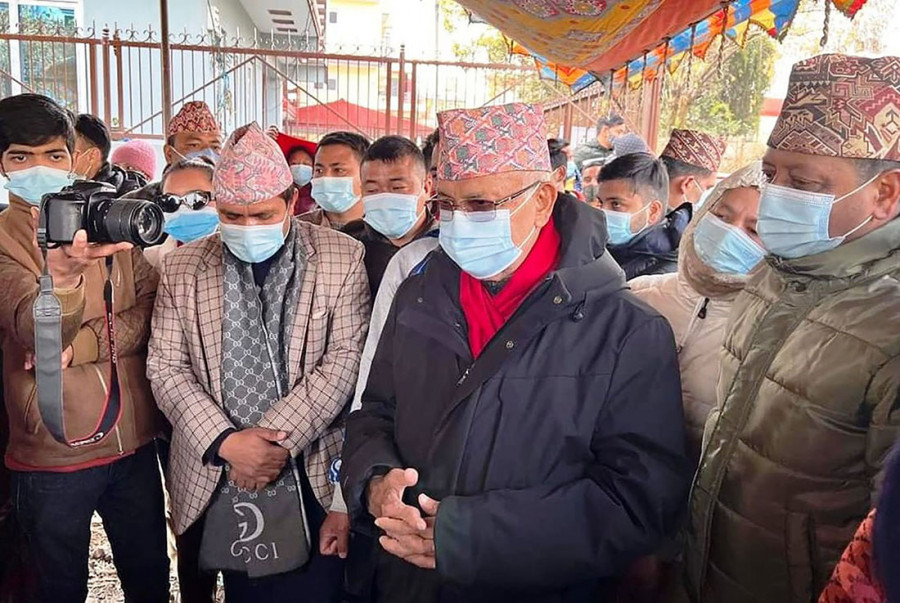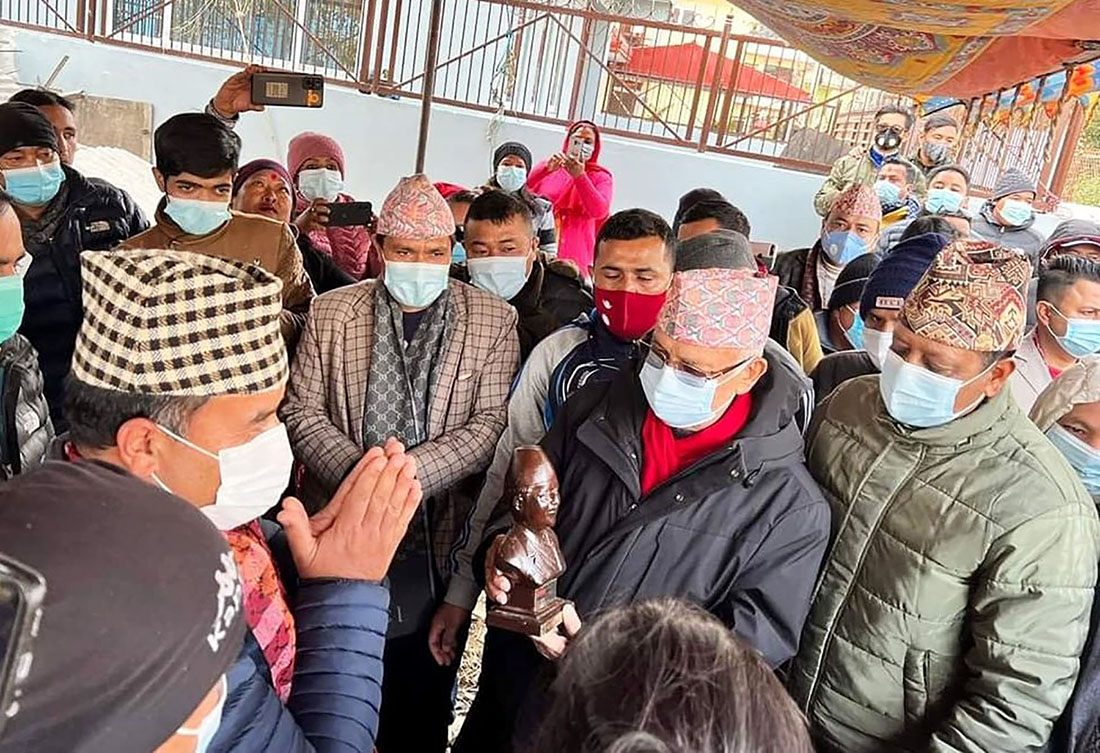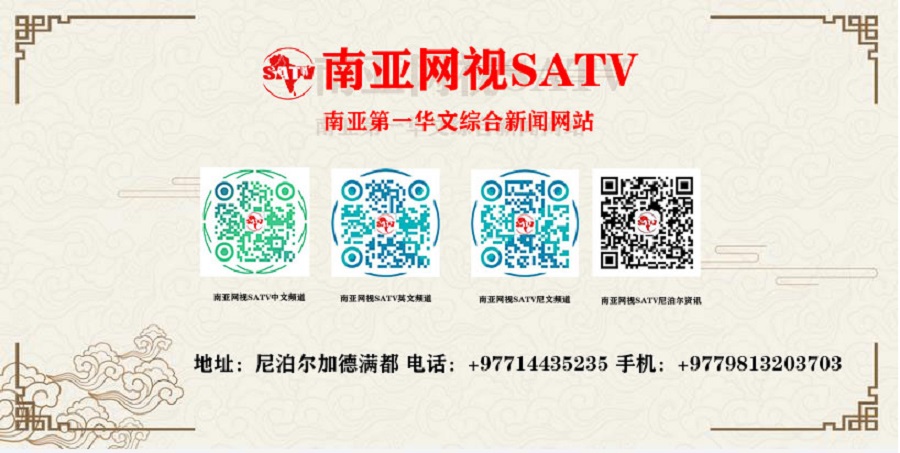
KP Sharma Oli is seen visiting an event in his Bhaktapur locality on Wednesday. RSS
CPN-UML chair KP Sharma Oli is known as a Covid denier. His public statements during his last tenure as prime minister had met with criticism, for he often said the coronavirus could be driven away by sneezing or drinking turmeric water or gargling with an infusion of guava leaves.
But he caught the coronavirus. His PCR test conducted on Saturday returned a positive result, his private secretariat said on Sunday. Given his compromised immunity—he underwent a second kidney transplant in March 2020—he was, according to doctors, at a greater risk.
Oli, however, seems to be doing well. At least the images that have made it to the public domain say so.
On Wednesday, five days after he tested positive for Covid-19, he attended a public function—he was in the midst of more than a dozen people.
And he clearly broke the government-prescribed Covid-19 protocols.
In a video posted on the YouTube channel of news website candanepal.com, Oli appears to be suggesting the need to maintain physical distance. But his followers, standing too close to him, say “we won’t get affected when ‘baa’ is there.”
“Baa”, which translates into father in Nepali, is the term Oli’s followers use to address him purportedly to express their affection for him.
Oli was apparently attending a function organised by the National Youth Association–the youth wing of the CPN-UML–at Balkot on Wednesday.
Members of his private secretariat, however, said the UML chair has not attended any public funcion.
“He is in isolation at his residence and has not attended any function,” said Ram Sharan Bajgain, one of Oli’s aides. “There could be some low key function at his residence.”
According to Bajgain, Oli may go for a Covid-19 test on Friday, “even though that is not necessary after seven days.”
Amid the spread of Omicron, the highly contagious variant of the coronavirus, there are different prescriptions for isolation. Some say five days of isolation is enough while others say the infected should isolate themselves at least for seven days.
Wednesday was the fifth day since Oli tested positive for the virus.
At Wednesday’s function, Kiran Poudel, chair of the National Youth Association, even said that the entire [UML] party believes the coronavirus cannot affect Oli.
“None of us believe that coronavirus can affect or weaken our chairman, who defeated all national and international attacks,” Poudel said at the inaugural session of the blood donation function.
Poudel on Thursday said that Oli was not invited to the function and that he was just giving instructions to party cadres. But later on, some youths gathered together to take photos with the party chairman.
“He was not invited to the function. He came only to instruct party cadres to maintain distance,” Poudel told the Post. “But youths gathered around Oli to take pictures. It was just a brief moment.”
The government protocol, however, does not say for how long or how briefly a virus-infected person could mingle with people. In the wake of coronavirus infections, authorities have enforced a slew of measures, including a ban on gathering of more than 20 people, a reduction from 25, and public and political functions that can attract crowds.
The order is in place in Bhaktapur, where Oli’s residence is and where he participated in the function on Wednesday, as well.
The function Oli attended had dozens of people.
“Every citizen should be aware of their health,” said Rudra Devi Sharma, chief district officer of Bhaktapur. “I came to know about the function only today. What can we say? Our duty is to warn people and urge them to take precautions.”

RSSPublic health experts say that Oli’s participation in a public function just five days after testing positive for the coronavirus is but negligence and violation of the protocol set by the government.
“Though the isolation period for the infected have been reduced to seven days by some countries, taking part in public functions just in five days cannot be justified,” Dr Sher Bahadur Pun, chief of the Clinical Research Unit at Shukraraj Tropical and Infectious Disease Hospital, told the Post. “What would ordinary people and his party workers think about the virus infection? They might think that if the virus does not transmit from leaders, it will also not spread from the general public.”
According to experts, people in power should exhibit more responsibility and lead by example. If they flout health protocols amid the pandemic, members of the public would not care much, they say.
Oli in the past has downplayed the virus not once but several times.
He even faced widespread criticism during the second wave of the pandemic for saying in an interview with CNN that “the virus situation is under control.” It was during the time when hospitals were turning patients away for the lack of oxygen, ventilators and beds and the death rate had gone up.
When people were contracting the virus, Oli was using Parliament or other platforms to undermine the virus threat, even peddling misinformation.
In his address to the nation on May 25, 2020, Oli said Nepalis would beat the virus because of their “strong willpower and immunity.”
Oli’ statement came just a month after Tedros Adhanom, director-general of the World Health Organisation, said that Covid-19 was 10 times deadlier than the 2009 Swine Flu pandemic. “We can’t treat Covid-19 exactly the same way as we treat the flu because the coronavirus which causes Covid-19 is a new virus to which no one has immunity,” Tedros had said.
On June 10, 2020, while responding to lawmakers' queries on the new budget, Oli spent a significant amount of time talking about the coronavirus and the “immunity” of Nepalis.
When opposition lawmaker Gagan Thapa sought scientific evidence behind his claims, Oli openly ridiculed him.
“Who said Nepalis have strong immunity?” questioned Thapa, to which Oli said: “I just said a while ago; did not you hear?” and his party members burst into laughter.
A little over a week later, Oli lectured National Assembly members on the virus.
“Corona is like the flu,” Oli said. “If contracted, one should sneeze, drink hot water and drive the virus away.”
He spoke at length about the benefits of turmeric, ginger and garlic and how their consumption would keep Covid at bay.
Oli once even downplayed the number of deaths, saying there was a compulsion to attribute the deaths to Covid because of the World Health Organisation protocol.
“Ideally it is expected that leaders of major political parties should be role models to the public,” said Pun. “What would people do, when the leaders themselves do not follow the rules?”
Doctors say that Oli was never serious about the virus during his tenure as prime minister. Nor does he seem to have taken the risk seriously even now, according to them.
“If ordinary people violate the rules enforced by the authorities, they are punished,” said Dr Baburam Marasini, former director at the Epidemiology and Disease Control Division. “Oli will be exempted, as he is a powerful person. Rules and regulations are only for the poor. But the virus does not distinguish between rich or poor, or powerful or weak.”













